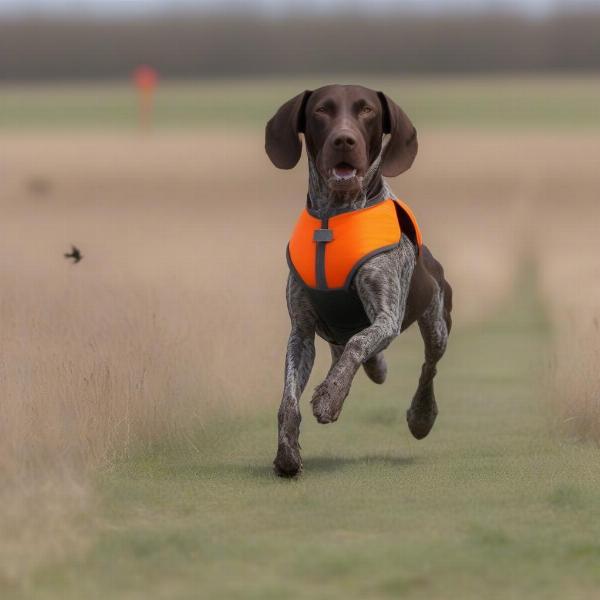Field dogs are a diverse group known for their athleticism, intelligence, and strong working instincts. Whether you’re a seasoned hunter or simply admire their energetic nature, understanding the specific needs and characteristics of field dogs is crucial for providing them a happy and fulfilling life. This guide explores the world of field dogs, covering everything from breed selection and training to nutrition and healthcare.
Choosing the Right Field Dog Breed for You
Selecting a field dog breed requires careful consideration of your lifestyle, experience, and the specific activities you plan to engage in. Some popular breeds include Pointers, Setters, Retrievers, and Spaniels, each with unique strengths and temperaments. For example, Pointers excel at locating game birds, while Retrievers are adept at retrieving waterfowl. Researching different breeds thoroughly is essential to find the perfect match. wakefield dog park offers a great environment to observe various breeds and interact with their owners.
Key Considerations When Choosing a Field Dog:
- Experience Level: Some breeds are more independent and require experienced handlers, while others are more amenable to novice owners.
- Living Situation: Active field dogs need ample space to exercise and may not be suitable for apartment living.
- Climate: Some breeds are better adapted to certain climates than others. Consider your local weather conditions when making your choice.
- Time Commitment: Field dogs require significant time for training, exercise, and socialization.
Essential Training and Exercise for Field Dogs
Field dogs thrive on physical and mental stimulation. Regular exercise is vital for their well-being and helps prevent behavioral issues. Activities like retrieving, running, and swimming are excellent ways to keep them engaged. Training should begin early and focus on obedience, recall, and specific skills related to their intended field activities.
 Field dog training exercise
Field dog training exercise
Effective Training Techniques for Field Dogs:
- Positive Reinforcement: Rewarding desired behaviors with praise and treats is a highly effective training method.
- Consistency: Maintaining consistent training routines and expectations is crucial for success.
- Socialization: Exposing your field dog to various people, places, and situations from a young age helps them develop into well-adjusted adults.
Nutrition and Healthcare for Peak Performance
Providing a balanced and nutritious diet is essential for maintaining your field dog’s health and energy levels. High-quality dog food formulated for active breeds is recommended. Regular veterinary checkups, vaccinations, and parasite prevention are also vital for their overall well-being. sheffield dog pound dogs for rehoming sometimes has field dogs that need homes, and understanding their healthcare needs is vital for prospective adopters.
Nutritional Needs of Active Field Dogs:
- Protein: A diet rich in protein is essential for muscle development and repair.
- Fat: Healthy fats provide energy and support overall health.
- Carbohydrates: Carbohydrates offer a readily available source of energy.
“A well-nourished field dog is a happy and productive field dog,” says Dr. Emily Carter, DVM. “Proper nutrition is the foundation for their physical and mental well-being.”
Grooming and Care for Field Dogs
While field dogs are generally low-maintenance in terms of grooming, regular brushing and occasional bathing are important for keeping their coat clean and healthy. Check their ears and paws regularly for any signs of injury or infection.
“Regular grooming not only keeps your field dog looking their best but also provides an opportunity to check for any potential health issues,” adds Sarah Miller, a certified dog groomer.
Conclusion
Owning a field dog is a rewarding experience, but it requires commitment and understanding. By providing proper training, exercise, nutrition, and healthcare, you can ensure your field dog lives a long, healthy, and fulfilling life, enjoying the activities they were bred for. Remember that choosing a field dog is a significant decision. smithfield dog offers further resources and information.
FAQs
- What is the best age to start training a field dog? Training can begin as early as 8 weeks old.
- How much exercise does a field dog need? Field dogs typically require at least an hour of vigorous exercise daily.
- What are some common health problems in field dogs? Hip dysplasia, ear infections, and certain types of cancer can be concerns.
- What is the average lifespan of a field dog? The lifespan varies depending on breed but is typically between 10 and 14 years.
- Are field dogs good family pets? Many field dogs make excellent family pets, but their energy levels and need for activity should be considered.
- What type of food is best for field dogs? High-quality dog food formulated for active breeds is recommended.
- How often should I groom my field dog? Brushing should be done several times a week, with baths as needed.
ILM Dog is your trusted resource for expert advice on dog breeds, health, training, nutrition, grooming, and much more. We are dedicated to providing dog owners worldwide with reliable and practical information to help them care for their canine companions. From choosing the right breed to understanding their specific needs, ILM Dog is here to support you every step of the way. For personalized guidance and expert advice, contact us at [email protected] or call us at +44 20-3965-8624. We also offer a wide range of products and accessories to enhance your dog’s well-being. Visit us at ILM Dog to learn more.